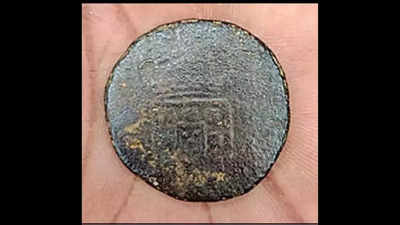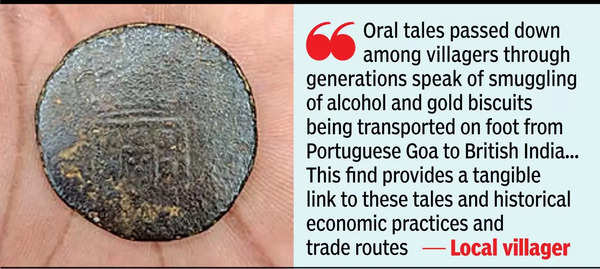In the jungles of Sattari, a remnant of King Miguel’s 1830s reign

Discovered along an ancient trade route, the coin offers insights into historical economic practices and smuggling activities between Portuguese Goa and British India.
PANAJI: A
Sattari
local has discovered a copper coin estimated to be around 200 years old. The coin, believed to date back to the early 19th century, was identified by archaeologist
Varad Sabnis
as a Portuguese tanga from the reign of
Dom Miguel I
, who was king of
Portugal
from 1828 to 1834.
Sabnis explained that the coin is known for its distinctive features and was used as currency during that period.
It weighs approximately 38-40g and is inscribed with ‘AP’ and ‘T’, standing for Asia Portuguesa and tanga respectively. “The tanga was a full coin, while a half tanga weighed around 18-20g,” he said.

While the discovered coin’s mint marks have suffered the vagaries of nature, historical images of well-preserved coins of the era show that the coin features the king’s coat of arms on the obverse, and the value indicated by the letters AP and T on the reverse.
Sabnis
said that the coin fell out of circulation with the introduction of a new currency series and was part of a broader economic history.
“The area where the coin was discovered is along an ancient trade route connecting Sattari to the markets situated above the hills, making it a plausible site for finding such historical artefacts,” he said. The discovery sheds light on the region’s past, including its role in smuggling activities, particularly from the 20th century, when economic blockades between Portuguese Goa and
British India
heightened such clandestine operations.
“Oral tales passed down among villagers through generations speak of smuggling of alcohol and gold biscuits being transported on foot from Portuguese Goa to British India. Since Karnataka is barely 20km away from here, it is possible that they smuggled these goods to Belagavi (Belgaum in British India),” a villager said. “This find provides a tangible link to these tales and historical economic practices and trade routes,” he added.
‘Findings link the tales with historical trade routes’
Oral tales that were passed down among villagers through generations speak of smuggling of alcohol and gold biscuits being transported on foot from Portuguese Goa to British India. Since Karnataka is barely 20km away from here, it is possible that they smuggled these goods to Belagavi (Belgaum in British India),” a villager said.
“This find provides a tangible link to these tales and historical economic practices and trade routes,” he added.

